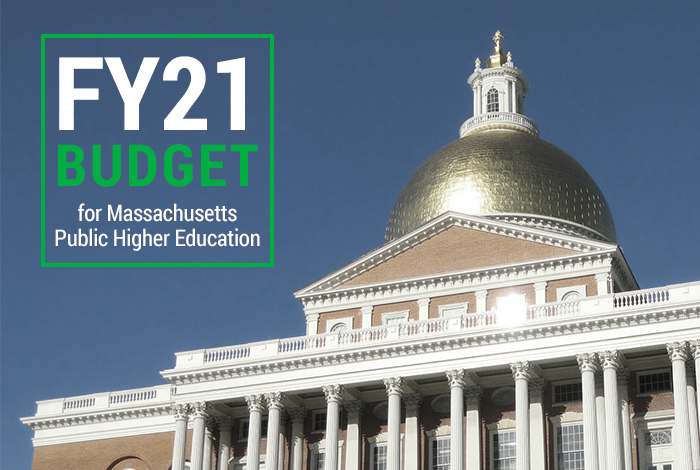
Kicking off the annual state budget process for public higher education, the Massachusetts Board of Higher Education endorsed its budget recommendations on January 10, 2020 for the fiscal year that begins on July 1, 2020.
The Board of Higher Education’s Budget Recommendations includes an introductory statement calling for a multi-year commitment to strategic and sustainable funding for the system of public higher education in Massachusetts. Affirming the Board’s commitment to the Equity Agenda, the budget narrative calls for increased funding for financial aid, student supports, and innovative and targeted strategies to close opportunity and achievement gaps by more intentionally and effectively supporting the needs of traditionally underrepresented and underserved students.
Building upon two years of funding for MASSGrant Plus, a last-dollar aid program launched in FY2019 to support full- and part-time community college students, the Board approved an incremental increase of $10M in need-based financial aid for in-state students attending Massachusetts state universities. MASSGrant Plus covers unmet need for tuition and mandatory fees with a stipend for books and supplies after accounting for all other public and institutional grant aid as well as expected family contribution (EFC). Over the course of the next several fiscal years, the Board is committed to seeking incremental funding to fully address this urgent need for all low-income students enrolled in public colleges and universities, and eliminate cost as a barrier to access, opportunity, and success.
The Board recommended $5 million for the Performance Management Set Aside, a $2.4 million increase over FY2020. This program supports the Higher Education Innovation Fund (formerly known as the Performance Incentive Fund or PIF) which continues to support competitive grants to campuses and consortia, as well as certain systemwide initiatives, to make progress on the goals articulated by the BHE. This program rewards best practices, innovative strategies, and cross-system collaboration to support student success and other system-wide goals. Funds are also used to facilitate data-informed decision-making and advance the use of data analytics and visualization tools to drive performance and accountability.
The Board recommended an increase in the Formula Funding accounts of approximately 2.5% of base appropriations. Formula Funding was first introduced in FY13 and combines foundational supports as well as allocations based upon prior year performance. At their peak, these accounts were funded at $20 million and $8 million for the Community Colleges and State Universities respectively. The Board’s recommendation would provide adequate funding to incentivize performance and invest in foundational supports to improve educational outcomes for all students and address the most significant disparities that prevent students from earning a post-secondary credential. By combining both adequate foundational supports with performance-based funding, campuses will have more effective tools to achieve statewide objectives and improve student outcomes.
Early College programs in Massachusetts emphasize equitable access and opportunity for low-income students, first-generation students, and students interested in high-demand, STEM-related disciplines. National research has shown a positive correlation between Early College programs and higher college-going rates among historically underserved and low-income high school students. Massachusetts currently has 17 officially designated Early College programs across the Commonwealth serving approximately 2,000 students, and even more are expected to be approved for FY2021. Therefore, the board has prioritized this program for a $2.25 million funding increase. This substantial investment would address the projected need for the increased cost of instruction in order to keep the program cost free to participating high school students.
These recommendations will be considered by the Executive Office of Education and the Governor’s Office as they prepare the Governor’s Budget Recommendation for all of state government.